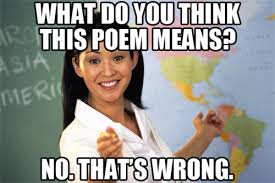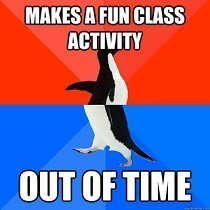Man-i-fest-o
…can be found HERE.
…can be found HERE.

First, I need to get this out of my brain:
1) I don’t care if you don’t like it! Life won’t always give you what you like!
2) I had to read boring books back in my day.
3) […Gah, there’s more. I know there is.]
And this, recently overheard or told by current English teachers:
1) Kids don’t read anymore (ad nauseum).
2) This is an English class. Speak English!
Yeaaah.
It’s astounding what will stick with you as you grow up. I forget where this was brought to my attention this semester, but it’s true: you tend to teach as you were taught. And the environment at the high school I’m observing at is pretty stifling. They’ve given up. They’re, for the most part, pretty old school. I worry being around these people of my ever giving up, throwing in the towel, and just doing whatever sounds reasonable to administration and parents.
But maybe that’s how it always has been. My teacher friends are involved in NCTE, NWP, and bitch on and on about standardized testing and piss off their administration when they do not teach to the test. These friends have involved me in conversations surrounding Alfie Kohn, Jonathan Kozol, Diane Ravitch, etc. I know about the teachers of Seattle’s Garfield High School boycotting their state exams. These are the values I believe in, too. But let’s face it: it’s scary to be the new kid in a sea of old skool teachers who have been doing this for a long time. The pressure to give in has to be immense.
I think about these things when I read articles like that of Moje’s as well.
How do you tell a teacher with 20-30 years of experience that no, kids do read. How do you tell a teacher with experience that YA lit can be literature. That reading something to death and then killing it again won’t help students? Or that the poor kids don’t need your hand up? Because these educators are a wealth of information and advice. They ought to be respected. And I will need their help. I am not here to burn bridges. I understand the discrepancy between theory and practice to the extent that I can.
But what do you do if you don’t think someone with greater seniority and influence agrees that it would help to provide texts that are relevant to the students’ lives? Or, you know, hey. Here’s my classroom library. How will I find time for this? I have no fucking clue anymore, but I think it’s really important.
I don’t mean to say all the teachers I’ve ran into this semester are against these things. Some allow their students to listen to their iPods while working in class. Some thoroughly respect their kids while still having strong boundaries laid out. One allows her students to continue to rewrite an essay until the grading period is over so that they come to understand a few things: (a) the writing process, and (b) that they can do really, really well. Some enjoy making Harry Potter references. One teacher really seemed to hone in on what her students would be most interested in and had them write an essay about it–and they were totally into it. It was neat to watch.
I do see a lot of privileging the higher-level students, those placed in the college-prep or AP courses. Their classes open up with things like a student’s favorite music video on YouTube followed with a discussion on the song and video itself. How cool is that? Others have been deemed smart enough to write a research paper on anything they liked as long as it had to do with the Great Depression (following their reading of Of Mice and Men). The lower level kids, however, they’re taught the five-paragraph essay because it’s “just easier. They need it.”
I say this hesitatingly because I’m not there very often, but there’s very little interest, it seems, in the activities of the minority outside of school. It’s easier to like the kids who are involved and do well (and yes, I can totally get that. It is easier).
And this is part of what struck me while reading Moje’s article–the students who wondered where Cesar Chavez is when MLK Jr. is everywhere. I’ve got a humble little start to what will be a classroom library. While I won’t be teaching in my area unless someone parts the ocean and there’s some kind of biblical flood to pure the district (or I just become totally desperate), I’m trying to gather books from cultures that represent my area. It’s not easy. I don’t know what I’m looking for. Further, I wasn’t exactly raised in a diverse area, and until about five or six years ago I balked at anything “PC.” So that part is a bit of a struggle. I’m fighting those things in my head, those things that I touched on as I began this post.
But I know there’s a need for it. Not just for the East Indian kids or the migrant kids, but for everyone. There needs to be, as Moje said, a collection of materials that speak to various interests (like hunting). There needs to be a willingness and even a excitement to get to know the students. There’s no get-rich-quick scheme, no one-size-that-fits all. The classroom represents so many different communities, motivations–kids who like to process their experiences through writing and others who can’t because it makes scary things too real. In a lot of ways the answer is “there is no answer.” And that, I think, is progress.
But this idea to somehow connect it to social networking. That’s interesting. Connecting what they read outside of school, that’s important. Building social capital. I wonder about video games because that’s never been my gig, but as an activity in class showed me it doesn’t always have to be Final Fantasy III or whatever the hell it is these days. Is this how we engage them in things that doesn’t concern them at home but which we’ve decided are important?
I struggle with this. I learned about deficit thinking only a few years ago, so when I read things that deal with that last sentence…how do we decide what is important? Is it by encouraging them to think outside their own boxes? I know Moje is right when she states “When they are asked to take a stand on social issues, young people often want to maintain their own impassioned stances toward social issues, rather than engaging in dispassionate critique using evidence” (25).
So…how do you do it? By dangling carrots? That won’t create passion. I don’t know. It seems that the biggest take-away is to get to know and respect their interests, try to incorporate them, discuss current events that are important to them, etc.
And in the meantime, work on your own issues that pressure you to give up and start offering them that ever-important “hand up.”
I tweeted this to Kim yesterday/this morning but then I thought maybe someone else here might REALLY REALLY like this, too. It’s a site ran by friends of a friend of mine in Austin–at least last I checked–and they do reviews and conversations about YA books and create drinking games, har, for some of them. They also discuss YA TV shows–not my most favorite part–and whatnot. They picked some serious fun at VC Andrews books a while back. I wasn’t sure what to do with that because I *loved* Flowers in the Attic as a kid but, you know. :/
Oooh, and it looks like they talk about nerd pop culture, too (ie: Doctor Who).
Anyway, it’s a way to keep up to date with things for will-be-teachers. And text speak. They do a lot of that, too: Forever Young Adult

Catchy title, huh? I know.
Also, I figured since the meme thing was my thing, I ought to make one, ha! (ha?)
I’m always leery of group projects and activities and whathaveyou, but I’ve really enjoyed what the other groups have had us do so far. As a future teacher, I tend to see everything through a pedagogical lens. These activities have thankfully lent themselves pretty easily to that, but beyond that the groups have offered me more resources that I can use later for myself, my kids, or my students.
/what everyone else has said
(I’m going to do a lot of summary. It seems to help me process and remember.)
Hip Hop and Literacy: I’d never heard of wix before, and so this was a revelation. Great site. BEAUTIFUL. I can’t wait to use it. I almost chose this group because it’s not something I’m entirely knowledgeable about but what information I have has really piqued my interest. Their site is really helpful. I’ve bookmarked it and plan to look back at it often. As to the activity, the compare/contrast of lyrics/poetry was a lot of fun–enlightening. I’d never looked at a rap song and compared it to a poem of a totally different genre (but similar themes). It was a really important lesson and one I totally intend to use one day.
21st Century Lit: I’m in Professor Kittle’s class, so some of the apps we worked with were familiar, but others weren’t. While I don’t consider myself totally inept or unaware, I’m constantly reminded of just how much I do not know. There’s so much out there. And the thing is, my students will know about apps and whatnot that I don’t. They can teach me, the class. I wonder what kind of activities they’d have their classmates do?
Gaming: Oh good gravy, I thought this would be Video Games and Literacy all over again, but their activity really surprised me. Like, I went to the video game station first because I figured I’d been in that book club so I’d know my stuff, right? Wrong. Anyway, each station had a trivia game of sorts, and you win that station’s sentence unit per correct answer. At the end you create your own sentence from what you have. THIS could be a cool activity, perhaps, for English learners, or modified for other skill sets. It was a fantastic example of gaming as a way to engage students with a reminder that it doesn’t always have to be electronic.
OH. And what I really, really liked about this activity was that it really called for actual group work. By that I mean that it’d be really hard for one kid to get stuck with doing everything. Everyone in the group has their strengths–their literacies–that they can play to. One might know everything about video games, but nothing about geography so THANK GOD their geography nerd group mate can take that one. And, in the end, they really get a better idea of what grammatical units go where in a sentence as well as what the hell they are.
“This sentence makes no sense.”
“Dude, you need a verb. Here, I got a million of them.”
That kind of thing. That was awesome.
DISCUSSION QUESTIONS! hooray!
1. Discuss the choice of the particular meme, font, style, etc. Why the one used and not another?
2. When do people display them? Why? Why not just use regular text or face-to-face interactions?
3. Where might you post them, and would you consider the best placement—do you think adolescents would, and why?
4. Are the image references something a younger person would understand, and if not, why would they use this particular image?
5. If you’re unfamiliar with memes (or a particular one), what is your initial reaction of them?